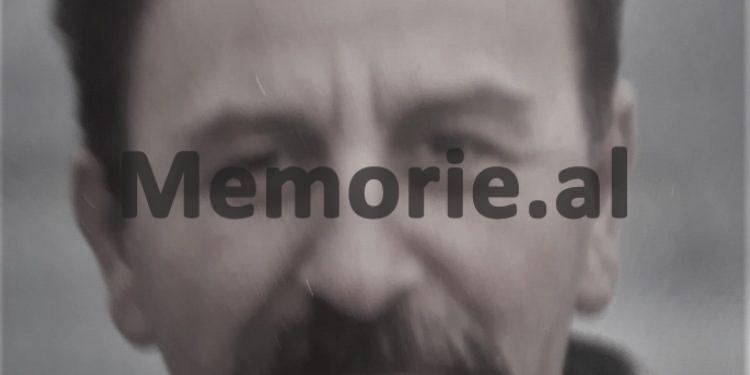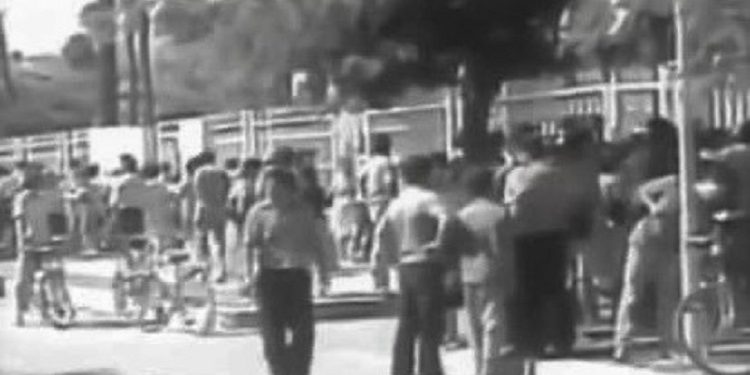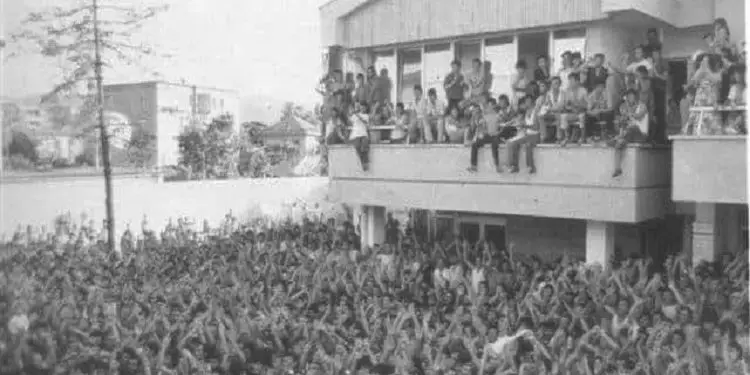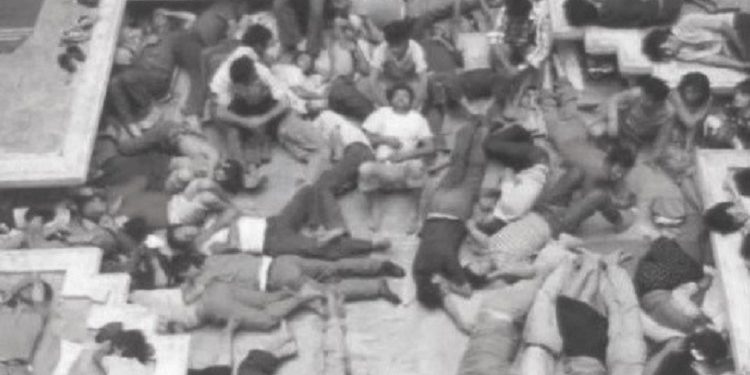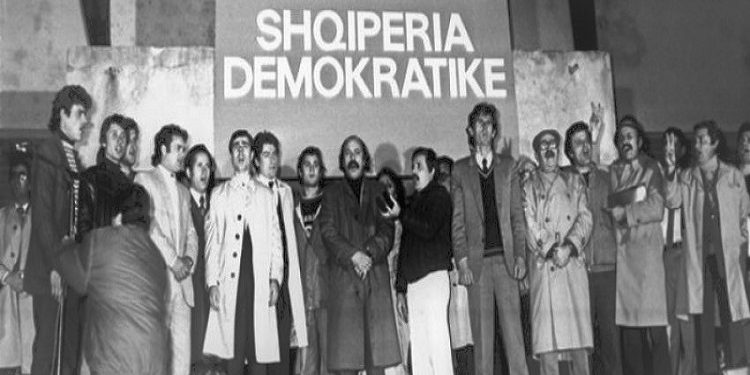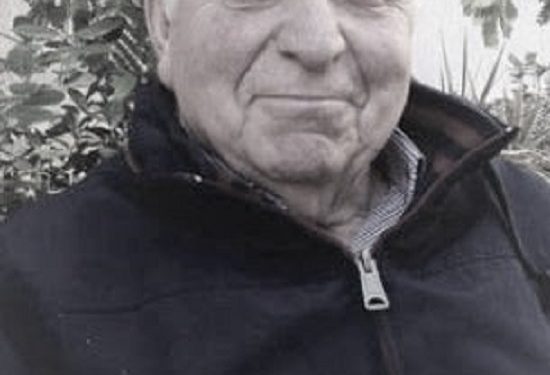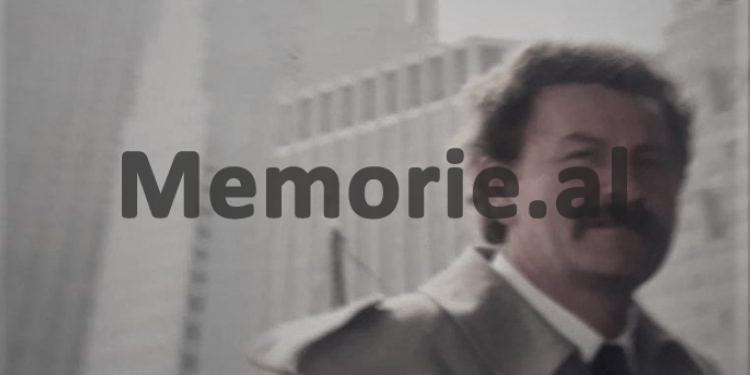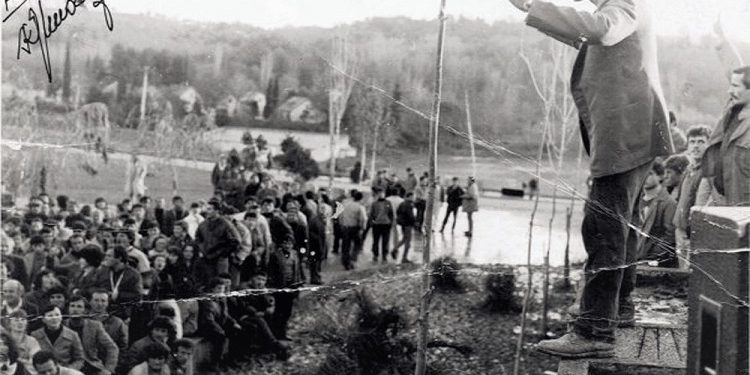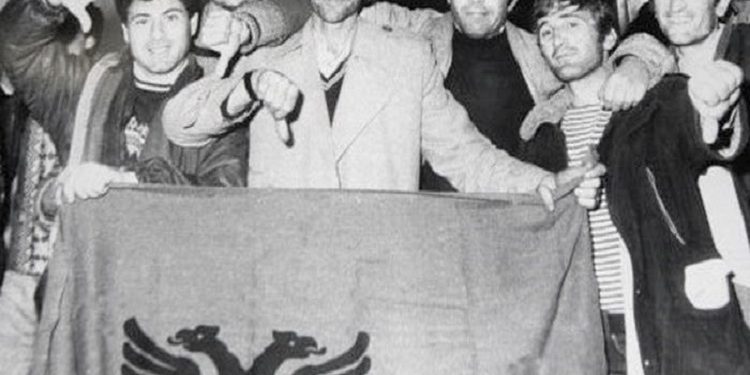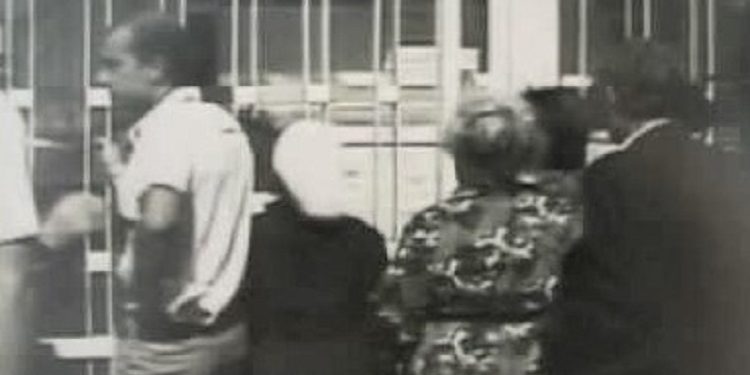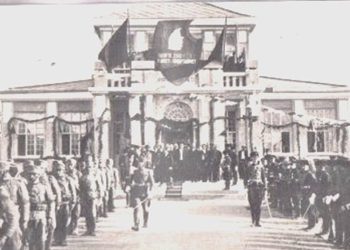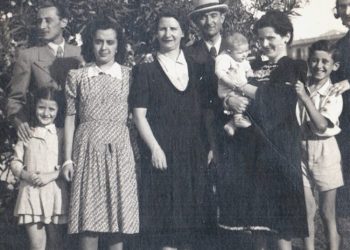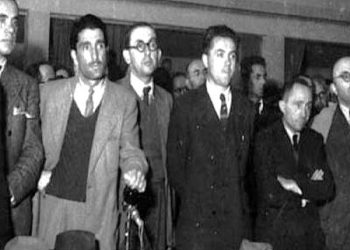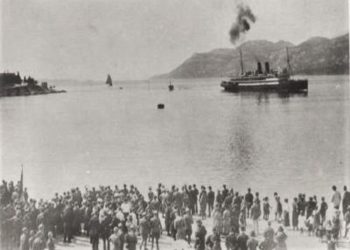By Bashkim Trenova
Part forty-eight
Memorie.al publishes the memoirs of the well-known journalist, publicist, translator, researcher, writer, playwright and diplomat, Bashkim Trenova, who after graduating from the Faculty of History and Philology of the State University of Tirana, in 1966 was appointed a journalist at Radio- Tirana in its Foreign Directorate, where he worked until 1975, when he was appointed journalist and head of the foreign editorial office of the newspaper ‘Zeri i Popullit’, a body of the Central Committee of the ALP. In the years 1984-1990, he served as chairman of the Publishing Branch in the General Directorate of State Archives and after the first free elections in Albania, in March 1991, he was appointed to the newspaper ‘Rilindja Demokratike’, initially as deputy / editor-in-chief and then its editor-in-chief, until 1994, when he was appointed to the Ministry of Foreign Affairs with the position of Press Director and spokesperson of that ministry. In 1997, Trenova was appointed Ambassador of Albania to the Kingdom of Belgium and to the Grand Duchy of Luxembourg. Unknown memories of Mr. Trenova, starting from the War period, his childhood, college years, professional career as a journalist and researcher at Radio Tirana, the newspaper ‘Zeri i Popullit’ and the Central State Archive, where he served until the fall of the communist regime of Enver Hoxha, a period of time when he in different circumstances met many of his colleagues, suckers of some of the ‘reactionary families’, etc., whom he described with a rare skill in a book of memoirs published in 2012, entitled ‘Enemies of the people’ and now brings them to the readers of Memorie.al
Continued from the previous issue
WITH “HEROES OF THE PEOPLE”
POLITICAL BUREAU AND THE PRESIDENCY
How did my conflict with Xhelil Gjoni end for the May Concerts, even though the editorial office of “Zeri i Popullit” demanded my sentence!
I made a self-criticism by admitting that I had not acted correctly that the conversations of the work in the Editorial Office, I had turned into conversations between friends in the cafe. I said that I did not intend to inform or misinform the Party. In fact, such a thing had not even occurred to me. I further insisted that at the meeting of the Editorial Board, Xhelil Gjoni had spoken to us about the criticism that Comrade Enver had made of the “May Concerts”. Here the resentment and anger of others were no longer contained. They proposed that I be punished because I was delving into mistakes. I still insisted on my stance. “I said the editorial meeting, after listening to them all, was recorded by the stenographer. Let his notes be clarified and we will see whether comrade Xhelil spoke about the criticisms of comrade Enver Hoxha “. After these words, Xhelili intervened and said that there was no need for me to be punished. So he closed the meeting. The others obeyed the conductor. I held no grudge either then or after. I saw them as crippled and felt sorry for them. Maybe I was afraid to hold a grudge against them because, in this case, they would accuse me of being a disruptor of unity, of being arrogant and not reflecting on the benevolent criticism of comrades, etc., stamps, which were not absent from the denigrating and annihilating communist vocabulary. After all, the “Voice of the People” College and the Bureau of the Party organization of this institution were just a miniature copy of the Politburo of the Labor Party. Her model of human depersonalization, of beheading of comrades and collaborators, “inspired” the whole Party, in every link, all institutions and production centers. The funeral march was played in the Politburo under the direction of Enver Hoxha. His scores were photocopied throughout the country.
At that time I thought that Xhelili, after securing the support of the Collegium and the Bureau of the organization, did not need to take the problem further. He could have punished me, he had all the opportunities, but I believe he also knew that I would object and that a noise, however small, on my part in those moments, outside the walls of the Editorial Office, might not have been favorable for her. About three decades later, a colleague of mine from “Voice of the People”, who lives in Brussels, talking about the past, told me that the stenographer of the Editorial Office had also been a collaborator of the State Security. In this case, I found another reason why Xhelil Gjoni did not accept the proposal of others to punish me, especially since I asked that, in order to get to the truth, the shorthand notes be clarified. Perhaps he was not sure about whether or not the stenographer had already done his duty to the State Security, that is, whether or not the Security had already been informed of the Editorial meeting. Normally, the stenographer should have considered this meeting as an ordinary working meeting, without any special interest. So, perhaps, even in this case it was more expedient not to wake the snake from sleep!
After the VII Party Congress, Xhelil Gjoni would leave the “Voice of the People”. He was elected a member of the Central Committee of the Party and joined the Party Committee of Tirana, as Secretary of this Committee for ideology and culture. If it had not happened like this, I would have left the “Voice of the People”. It became increasingly impossible to work with. He never forgot the “May Concerts”.
How Xhelil Gjoni wanted to ignore me, not shaking my hand when we met at work!
In the circles of his friends and in those of journalism he began to spread the opinion that: “The Union is a good analyst, but not a good commentator on the notes of the day.” This meant that my country was not in a daily newspaper like the Voice of the People, but somewhere else. Where? It did not matter. The main thing was to leave the newspaper, as not suitable for her profile. It has happened to me several times to be in front of Xhelil Gjoni, very close, in different environments. He used to go out for a walk on the main boulevard of Tirana. Always, in these cases, he liked to be accompanied by a suite of friends or apparatchiks, who followed him from behind. Xhelili, holding his head up as if he wanted to be vigilant that no star would fall from the sky, even cast a sideways glance to control the road and passers-by. It has happened that by chance, sometimes, our gazes have been crossed for a moment. I say “for a moment” because he was careful to immediately raise his head again towards the sky, which neither greeted nor waited for greetings.
Xhelili, being at that time one of the leaders of the Party for Tirana, should have been, in principle, also an example of the virtues, so much advertised revolutionary, for all the communists, who lived and worked in the capital. His behavior, not to go too far, but even in the evenings of Tirana on the main boulevard of the capital, had nothing in line with the propagated communist theory and morality. Perhaps true communist morality was characterized by a lack of any morality! Maybe those who understood this truth were real communists!
Once, when the editor-in-chief of “Zeri të Popullit” was Mehmet Elezi, I do not know why, Xhelil Gjoni came to the Editorial Office in a meeting with journalists. We had previously been notified to gather at the editor-in-chief’s office. At the appointed hour he set out for the meeting place. In the living room in front of the editor-in-chief’s office, I noticed Xhelil Gjoni and Mehmet Elezin. They had been standing and talking. Since Xhelili had not wanted to greet me for a long time, I passed by him and respected the example he had given me. I pretended not to notice. So I passed without greeting her. Not being original, but a bad copycat, I did not succeed. Xhelili “sabotaged” me. After I turned my back on him, he said to me, “Why do you not greet me, or have you grown up?” I turned around and saw that Mehmet was justifying me in front of him. I approached Xhelil and said a few words as nonsense, more or less: “No, friend Xhelil, but I thought you …”!? Comrade Xhelil could not accept that someone might not even see him, might not even greet him, that someone might not notice his presence. These “rights” belonged to the dome, but not to a simple communist. I had again stepped where I should not and again Xhelil Gjoni would not forget to show me the place.
In the office of the editor-in-chief, where the members of the Collegium and the journalists of “Voice of the People” had gathered, Xhelili shook hands with everyone. He did the same with the journalists who were on my right or left wing. He “forgot” me. I think he thus wanted to show in front of others that he ignored me. Petrit Çani, an old journalist of “Voice of the People”, who accompanied him in this handshake, reminded him of “forgetfulness” by saying: “Union, comrade Xhelil”! So you forgot the Union, comrade Xhelil. I, found in an unpleasant situation in front of colleagues, hurried to utter: “We have already met in the living room.”
Something similar had happened to me before with Xhelili in one of the halls of the Kinostudio “Shqipëria e re”. I was in Kinostudio because there, in one of its premises, together with the artists of the Circus, the Variety, the National Theater and the leaders of the League of Artists and Writers of Albania, I did the choir, the same training or military training. During a break between two hours of military training, Xhelil Gjoni happened to pass by us. He extended his hand to everyone in the group where I was part, he “forgot” me, so he did not forget to “forget” me, especially in public. Thus he demonstrated the arrogance of the powerful man. This always gave him pleasure.
Kujtim Spahivogli told the journalist Ilir Kadia that when he was interned, Xhelili destroyed his house with a tractor!
I do not pretend to make the full portrait of Xhelil Gjoni, especially starting simply from the relationships, misunderstandings or disagreements we have had. I, however, was no exception. I wrote a little above about a casual meeting with him at Kinostudio. I think he approached us because in our group, there were many people and personalities of art and culture. He wanted to be close to the artistic circles and personalities of the country. It seems to me that this, regardless of place and time, is manifested by all the dictators in power or potential dictators, who rival, intrigue and conspire to come to power. They are complex towards people of art and culture. On the other hand, this complex does not prevent them at all, when they ask for their interests, to show without any hesitation as they are, Tirana and without any human feeling to the personalities of art and culture.
Ilir Kadia, former journalist of “Voice of Youth”, which was published during the dictatorship as a body of the Central Committee of the Albanian Working Youth Union, in an interview given to “Gazeta Shqiptare” in November 2010, says: “A friend my late Kujtim Spahivogli, in ’82, when he came from exile in Bërzhitë, he told me that he was not so angry with Enver Hoxha, but with Xhelil Gjoni. “Kujtim Spahivogli, to demolish my house on” Bardhyl “street when I was sentenced and my mother oppressed me for a while…
Xhelil Gjoni, servile to Enver Hoxha, opposed Kadri Hazbi in the plenum!
To present more fully the personality of Xhelil Gjoni, which I judge as extremely negative, as aggressively negative, I will touch a little on the attitudes he has held towards some important developments in the political life of the country, when he was at the highest points High communist dome; member of the Politburo and later Secretary of the Central Committee of the Party. More or less at the same time as Xhelil Gjoni sent the “tank” to demolish Kujtim Spahivogli’s house, he acted as a “tanker” in the inquisition trials organized by Dictator Enver Hoxha to eliminate his closest collaborators. This is what he did, for example, in the “trial” against Kadri Hazbiu, a former member of the Politburo and Minister of Interior. Kadri Hazbiu was charged and executed as an enemy of the Party and as an accomplice of former Prime Minister Mehmet Shehu. From the case report, I took this intervention of his: “You Kadri, say in self-criticism that you had familiarity, on what basis? Based on the norms of the Party, of course not, but then on what basis? It goes without saying that it was based on the violation of the norms…. Concretize »! , Dictator Enver Hoxha had annihilated and continued to annihilate the members of the communist dome.
How Xhelil Gjoni shouted and shouted at the rally for July 2 in “Skënderbej” Square!
In my memory, as well as that of all Albanians in the penultimate years of the dictatorship, Xhelil Gjoni remains “perfect” in his role at the July 1990 rally. My generation, our parents and our children remember how on July 2, 1990, over 5,000 young people who came to Tirana, from all over Albania, whole families with children, clashed with law enforcement, smashed the doors of Western embassies and sought political asylum. They risked their lives, the lives of their children and their families, and sought to escape the great evil that had plagued the land. It was not really those who fled the homeland, it was communism that expelled them. Under communism, no one had a secure life, no one felt free and at peace, but every day more closed, more endangered, poorer, and hungrier, fewer people. The dictatorship was forced to allow the departure from Albania of all those who entered the embassy, about 5,200 people, but it could not accept, at the same time, that the “bells” of the embassies had finally killed the fear and that without this weapon “her era”was over.
To neutralize the consequences that left in the psychology and in the soul of the Albanians the mass departure through the embassies and to show that the state of dictatorship continued to be strong, a big rally was organized in the central square of the capital. It was “spontaneously” attended by about 120 thousand people, employees of the capital’s institutions, workers of factories and plants as well as troops of military units. I remember well the road we followed to go from the State Archive to “Skënderbeg” square where the rally would be held. The entrance to Stalin Boulevard, as it was then called, was blocked by several stationary buses, barricading it across its entire width. For rally participants, a small space between buses was allowed as a crossing point. Special people followed each passerby. Institutions or production centers had to provide guarantees for the identity of every passer-by, who was included in their ranks. I also remember the arrival and setting up of the State Archive staff, where I worked then, in Skanderbeg Square, the squads of military units among the crowd as well as the snipers on the terrace of the National Historical Museum.
The keynote speech at the rally was delivered by Xhelil Gjoni. According to him, those who left the Homeland, through the embassies, were some hooligans and scum, who did not represent the Albanian people. After the rally, from the top of the Politburo Olympus, he ordered that all communists whose children or relatives had entered the embassy be expelled from the Party. Xhelil Gjoni shouted with all the force of his throat at the rally, taking patriotic poses or, more precisely, hiding behind patriotism, as criminal politicians or ordinary dalkauks and mobsters have always done in history. Xhelil Gjoni was not deceived by anyone; no one took him out of his will and desire to the rally in July 1990. Even if he was charged by others to come out and speak as he spoke, he liked it. The rally presented him as the main leader of the Party even though still the First Secretary of the Party was Ramiz Alia. The rally presented him as the iron hand of the dictatorship of the proletariat at a key moment in the history of the country, that is, as the Messiah of Albanian communism, why not of the people and the Homeland! The rally paved the way for him to climb to the highest point of the party and state pyramid, in which Ramiz Alia could no longer stand for a long time, timid, unable to make the decisions that history requires of a statesman, weak to face history, without a strong voice to say: “The party is here. I’m not here. ”
On the way to becoming a dictator when the dictatorship came to an end, Xhelil Gjoni, almost a month after the rally in Tirana where he cursed the Albanian boys and girls, who risked their lives and chose Europe to live, will speak openly against the European aspiration of to all Albanians. At the meeting of the Politburo on August 23, 1990, when the possibilities and impossibilities of Albania being accepted as an observer in the European Cooperation and Security Council were examined, he said: “I do not look at this entry as observers, that we will gain anything, if we do not give up on principled things. If we told them that we would have pluralism, if we told them that we would have a market and private property, it means accepting to become Europe. “I remember we should not allow this.”
Xhelil Gjoni threatened the students of December ’90 that he would take the tanks out on the street!
In the same line of the “iron hand”, even more openly, Xhelil Gjoni will be presented again a few months later, in December 1990, when the Democratic Movement in the Student City began. The journalist of “Voice of Youth”, Ilir Kadia, secretly recorded a short speech of Xhelil Gjoni given at the beginning of the Democratic Movement in front of the political leaders of the institutions of the capital. Xhelili told them: “Last night the students shouted for lights. How did we all run away, they also ran away from them, right?! And they had shouted not only in their rooms, but also outside, in the streets. And they wanted to go to the square as well. We pulled out some cops and inserted some sticks into our asses. We did not take out tanks, because there was no need, but we have them too. Students are our children, but it is understood who is hiding behind them. Do you understand or not?! Enemy. There is no other word…! “Now there are rumors that they want to go out in the square again, but let them try it, but it kept them.”
At the meeting of the Politburo on December 11, 1990, a day before the establishment of the Democratic Party of Albania as the first opposition party to the dictatorship, Xhelili continues to reject party pluralism and denigrate “some beards” who had gathered in Student City for this purpose. The man of the tank chain, however, is no longer menacing. He, even, is shy. Before the Politburo, he will declare that the situation or “the problem is so serious that it will come to our head.”
Certainly I did not know at that time the statements or discussions of Xhelil Gjoni in the Politburo or in closed meetings with the political cadres of the Party. However, I knew Xhelil Gjoni well enough from my life as a journalist, but also from his speech at the infamous rally in Tirana. I knew him even from the calls of students and tens of thousands of citizens of Tirana who gathered in those December days in the Student City shouting: “Enver-Hitler! Down with dictatorship! Down with Xhelil Gjoni ”! If Enver Hoxha was so openly identified with the Nazi dictator, Xhelili and still not Ramiz Alia, he would be identified with the communist dictatorship.
How I handed over the party card in protest, after I spoke against Jelly John and the measures the party was taking in December of the ’90s!
In the course of events, on December 14, 1990, the meeting of the basic organization of the Party took place in the General Directorate of State Archives where I was working at the time. In my discussion, among other things, on this occasion I said: “Renewal” of the leadership of the Party with a “strong hand”, like that of Xhelil Gjoni, I think that not only does not change anything for the better here, but rather acts quite bad. Thousands of students chanted in the last days in the square near their city “Down Xhelil Gjoni, down Xhelil Gjoni”! The party finds it as such it needs to be raised! Let him raise it, perhaps he judges rightly and appropriately. I cannot judge so. And, since I cannot change anything here, the only thing I can do is not accept being led by people like him or supporting him. “I cannot blindly believe in the use of violence against students, or in the above.” After these words, I handed over the card of the member of the Labor Party, so I distanced myself from it. I believe I am the first communist who, under the circumstances created, handed over the membership card and left the Labor Party in protest.
Xhelil Gjoni asked to be expelled from the Party; after I sat down I distanced myself from it?
The Albanian Labor Party was used to expelling its members, but not expelling it from any of its members. How unusual my action was, I believe is proved by the reaction of Xhelil Gjoni. He, when he was acquainted with the decision I had taken, summoned General Minella to the meeting. This, as far as I remember, was at that time either secretary or deputy secretary of the basic organization of the State Archives Party. As Minella herself told me in those days, Xhelili asked him to convene the basic organization of the Party and expel me from the Party. Minella tried to reason, saying that the Union is no longer communist and that someone who is part of it can be expelled from the Party, and not someone who is no longer a member of it. After Minella, he also met my old friend, Fatmir Kumbaron, to whom he addressed the words: “Hey, did you see what your friend did”?! What the Party did, what he did, did not matter to Xhelil Gjoni. All his life as editor-in-chief of “Voice of the People” or as one of the leaders of communism, he only accused and never recognized the right of others to accuse him.
Even now that I am writing these notes, he continues to accuse others, he does not spare even the widow of the dictator, Nexhmije Hoxha, nor Ramiz Alia, who were also blamed for some of the dictator’s own sins. He does not spare even those who followed Ramiz Alia, according to him, without any special merit, but simply because he had “caught their ear” and told them what to do and what should be done. Only one has escaped his accusations, only one has deserved his worship. This is Dictator Enver Hoxha. “I think that if Enver had been alive”, Xhelil Gjoni stated in the press recently, “He would have made the change in time and would have brought pluralism”. Enver’s little student, Xhelil Gjoni, turns out to be more Enverist than Enver himself! After being lucky that Enver was not alive when he opposed party pluralism and that Albania became Europe! /Memorie.al
The next issue follows




